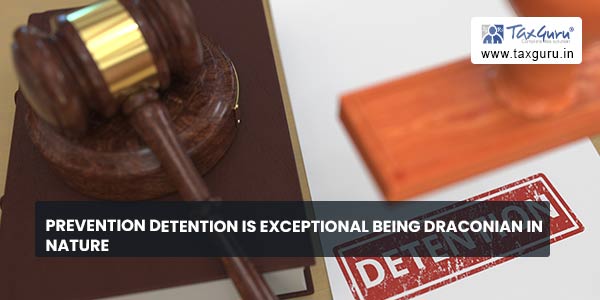In last few months, it is manifest that the law of prevention detention is being invoked progressively by department. The legal provisions of the preventive detention are exceptional and even draconian in nature and can be invoked only in extreme cases. It is imperative to mention here that personal liberty is one of the most cherished freedoms more important than any other guarantee under the Indian Constitution and in a democracy governed by rule of law the drastic power to detain a person, without trial, must be strictly construed. Article 22 of the Indian Constitution was specifically inserted and extensively debated in the Constituent Assembly to ensure that the exceptional powers of preventive detention cannot be converted into a draconian and arbitrary exercise of state authority. As stated above, the law of prevention detention is exceptional and cannot be used as a substitute for the regular criminal law.
The Hon’ble Supreme Court in the matter of Mallada K Sri Ram Vs State of Telangan and others [2022, SCC Online SC 424] has held as under:

“However, the personal liberty of an accused cannot be sacrificed on the altar of preventive detention merely because a person is implicated in a criminal proceeding. The powers of preventive detention are exceptional and even draconian. Tracing their origin to the colonial era, they have been continued with strict constitutional safeguards against abuse. Article 22 of the Constitution was specifically inserted and extensively debated in the Constituent Assembly to ensure that the exceptional powers of preventive detention do not devolve into a draconian and arbitrary exercise of state authority”.
In the case of prevention detention, it is mandatory upon the detaining authority to make out the compelling reasons that why person needs to be detained. The object of prevention detention law is not punitive but essentially a precautionary measure to prevent the commissioner of certain offence. The subjective satisfaction with proper application of mind in indulgence in offence must be there and interference in that regard has to be drawn from objective data.
The Hon’ble Supreme Court in the matter of Rajesh Gulati Vs Govt of NCT of Delhi [2002 (7) SCC 129] categorically examined this issue and held as under:
“It cannot be over emphasized that the object of detention under the Act is not to punish but to prevent the commission of certain offences. Section 3 (1) of the Act allows the detention of a person only if the appropriate detaining authority is satisfied that with a view to preventing such person from carrying on any of the offensive activities enumerated therein, it is necessary to detain such person. The satisfaction of the detaining authority is not a subjective one based on the detaining authority’s emotions, beliefs or prejudices. There must be a real likelihood of the person being able to indulge in such activities, the inference of such likelihood being drawn from objective data”.
The likelihood for continuation of violation is sine qua non in the case of preventive detention. Further, past antecedent of the detune is also much needed to be considered while invoking the provisions of prevention detention. The detaining authority is bound to indicate that there is likelihood for organized act and commission of offence. In this regard, the Hon’ble Supreme Court in the matter of Pooja Batra Vs UOI [2009 (237) ELT 17 (SC)] has held as under:
“In an appropriate case, an inference could legitimately be drawn even from a single incident of smuggling that the person may indulge in smuggling activities, however, for that purpose antecedents and nature of the activities already carried out by a person are required to be taken into consideration for reaching justifiable satisfaction that the person was engaged in smuggling and that with a view to prevent, it was necessary to detain him”.
“..In the matter of preventive detention, what is required to be seen is that it could reasonably be said to indicate any organized act or manifestation of organized activity or give room for an inference that the detenue would continue to indulge in similar prejudicial activity warranting or necessitating the detention of the person to ensure that he does not repeat this activity in future”.
The Hon’ble Delhi High Court in the matter of Farha Hussain Vs UOI [2018 (16) GSTL 29 (Del)] examined the issue of likelihood of continuation of violation and past antecedent and held as under:
“No likelihood of continued violations
44. The alleged propensity of the Detenue to continue to commit any such fraudulent acts is also not convincing in view of the order of the Commissioner of Customs (Preventive) which acknowledges how difficult it is for any individual to simply hack into the EDI System. Moreover, it is not disputed that the scripts in question are valid only for a period of 18 months. No details have been given in the grounds of detention as to which of the scripts will continue to remain valid beyond 2 nd January, 2018 which would warrant the continued detention of the Detenue.
45. The Court repeatedly asked the learned counsel for the Respondents to demonstrate before it in what manner the Detenue would, if the detention order was quashed, be in a position to undertake any of the alleged harmful or prejudicial activities mentioned. The learned counsel for the Respondents was unable to do so. Since no past antecedents of the Detenue have been pointed in the grounds of detention, there was no material to support the conclusion that the Detenue possesses the propensity or potentiality to indulge in smuggling activities in the future”.
The burden of showing that the detention is in accordance with the procedure established by law is always on the detaining authority because of clear and explicit terms of Article 21 of the Indian Constitution. The detenue has right to put his effective defence against his detention. Its duty of detaining authority to keep ready all copies of documents, statements and material relied against detenue and supply the same within time frame manner. The prevention detention is an area where the court has been most strict and scrupulous in ensuring observance with the requirements of the law and even where a requirements of law is breached in slightest measure, the court has not hesitation to strike down the order of detention as settled by Hon’ble Supreme Court in the matter of Ichhu Devi Choraria (SMT) Vs UOI [ 1980 (4) SCC 531].
Conclusion:
In view of aforesaid settled proposition of law, it is very much clear that law of prevention detention is exceptional. The likelihood for continuation of violation is sine qua non in the case of preventive detention. It is draconian in nature and cannot be resorted casually, mechanical manner and without application of mind. The power of detention affects personal liberty mandated under Article 21 of Indian Constitution which is one of cherished freedom and cannot be used as a substitute for the regular criminal law.





